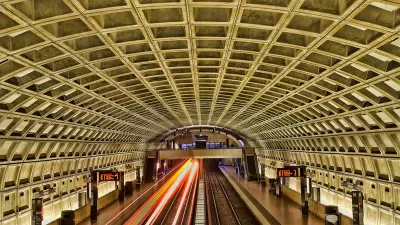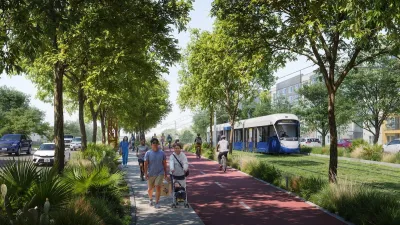Facing a $750 million ‘fiscal cliff,’ the agency says it’s important to continue looking forward to ‘visionary’ future plans.

The Washington Metropolitan Area Transit Authority (Metro) announced ambitious goals to add new buses or even a rail line to its system to ease pressure on capacity in the Rosslyn Tunnel, writes Jordan Pascale in DCist.
“But what about Metro’s $750 million fiscal cliff we’ve heard about in recent weeks?” Pascale asks. “WMATA officials who briefed the media on Monday acknowledged it is challenging to talk about the near-term fiscal cliff and structural operating deficit and these larger regional plans, but they say it is important for the region to continue planning for these larger visionary plans even while working through short and medium-term structural issues.”
Providing background on “the Rosslyn problem,” Pascale explains, “The Rosslyn tunnel serves the Orange, Blue, and Silver lines and can carry 26 trains per hour. Metro used to run rush hour service that was limited by that capacity, but Metro is now scheduling 16 trains an hour through the tunnel and soon hopes to run 20 trains per hour in the coming months.”
According to Metro, “new lines could improve equity transit accessibility in lower-income areas, and improve sustainability by getting more people on transit.” Pascale details the options Metro is considering, which include building a new tunnel under the Potomac and separating the Silver or Blue lines, as well as lower-cost alternatives that would add more buses or Bus Rapid Transit (BRT) routes. See the source article for more information on each proposal.
FULL STORY: Will Metro Go Ahead With Its Biggest Rail Expansion Since The Silver Line?

Planetizen Federal Action Tracker
A weekly monitor of how Trump’s orders and actions are impacting planners and planning in America.

Maui's Vacation Rental Debate Turns Ugly
Verbal attacks, misinformation campaigns and fistfights plague a high-stakes debate to convert thousands of vacation rentals into long-term housing.

Cuomo Is the Candidate of Both NIMBYs and Developers. What Gives?
In the New York City mayoral race, odd bedfellows align to preserve the housing status quo.

The Subversive Car-Free Guide to Trump's Great American Road Trip
Car-free ways to access Chicagoland’s best tourist attractions.

San Antonio and Austin are Fusing Into one Massive Megaregion
The region spanning the two central Texas cities is growing fast, posing challenges for local infrastructure and water supplies.

Charlottesville Temporarily Has No Zoning Code
A judge ordered the Virginia city to throw out its newly revised zoning code, leaving permitting for new development in legal limbo.
Urban Design for Planners 1: Software Tools
This six-course series explores essential urban design concepts using open source software and equips planners with the tools they need to participate fully in the urban design process.
Planning for Universal Design
Learn the tools for implementing Universal Design in planning regulations.
Heyer Gruel & Associates PA
JM Goldson LLC
Custer County Colorado
City of Camden Redevelopment Agency
City of Astoria
Transportation Research & Education Center (TREC) at Portland State University
Jefferson Parish Government
Camden Redevelopment Agency
City of Claremont





























